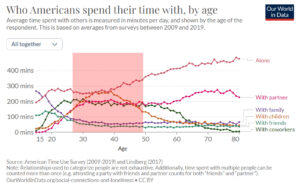In today’s fast-paced world, managing burnout in the workplace is a priority. The demand on our time has increased significantly, meaning practical strategies to mitigate this have become ever more important.
From work to family responsibilities, we’re constantly juggling multiple tasks at once. A recent chart created by Our World in Data highlights how Americans spend their time by age. Beyond mere statistics, this chart has significant real-world implications for managers and leaders, especially those in the 40% who attain their first managerial position between the ages of 25 and 30.

Burnout: The Perfect Storm
According to the research cited above, Americans aged between 25 to 54 spend an average of 8.8 hours per day on work and work-related activities. This is significantly higher than the 7.8 hours per day spent on leisure and sports activities.
In the UK, senior managers work an average of 50 hours per week, while middle managers work an average of 43.3 hours per week. This is significantly higher than the national average of 38.5 hours per week, according to 2020 data from the Chartered Management Institute (CMI).
Considering that the average age of parents in the UK when their offspring leave home is around 48 years old, managers with children who fall within the Our World in Data age range will likely be juggling both work and family responsibilities simultaneously. This increased demand from both home and work thus creates something of a danger zone, leading employees to burnout. The same can of course apply to those who care for ageing parents or a sick partner/family member, or deal with chronic illness themselves.
In the past, the traditional expectations placed upon a manager were to work long hours and prioritise their career over their personal life. However, times have changed for the better – this view is no longer sustainable or desirable, as research has shown that overworking can lead to burnout and other negative consequences for employees’ mental and physical health.
Today, managers face a more complex set of challenges requiring them to balance their personal and professional lives effectively. With the rise in remote working and flexible working policies, some managers are now overseeing their teams from a distance. Working from home can blur the lines between work and personal life, creating new challenges such as managing distractions and maintaining focus on work-related tasks.
There’s growing recognition in modern society that work/life balance is of paramount importance. Managers are encouraged to be sensitive to the needs of their employees and to foster a culture of flexibility and support, enabling their team to manage both professional and personal responsibilities effectively.
The stats speak for themselves: according to a study by Gallup, three-quarters of employees report feeling burned out at work at least sometimes.
How to Deal With Burnout as a Manager
So, what does this mean for managing burnout in the workplace if you’re a leader or manager?
Whilst outdated expectations still persist in some contexts, most organisations understand that prioritising work over personal life is both undesirable and unsustainable for any employee. Therefore, it’s a priority for businesses today to support their managers in finding ways to achieve a good work/life balance, maintaining their health and well-being whilst nurturing their team to attain their goals.
For managers themselves, practical steps to achieve this include:
- Checking inbound communication such as emails, phone calls and instant messages on a schedule of your choice (rather than reactively when a notification pops up!).
- Being selective with which meetings you attend and sufficiently preparing for those which do require your presence.
- Plan, Commit, Execute: scheduling each task you need to do, telling any stakeholders when exactly you will be doing it, and sticking to the schedule you’ve set out wherever possible.
- Anticipate and Adapt: scheduling what you know and preparing to be flexible around any last-minute changes.
Practical steps for companies to support their managers include:
- Recognising and making adjustments for the struggles associated with this life stage.
- Training and coaching your managers and leaders to be more organised and more resilient.
- Regularly checking in on the health and well-being of your managers and leaders.
The fast-paced world that we live in today has made it more challenging to effectively balance work and personal responsibilities. However, with careful planning, prioritisation and the support of their organisation, managers and leaders can use their time more wisely and deliver on these responsibilities without burning out. Practising self-care in this way is key to leading a healthy and productive life, both at home and in the workplace.
For more information about how Avilio could help you and/or your organisation, please don’t hesitate to reach out to our founder, Philippe.
Alternatively, why not read our article on 7 ways you can improve your company culture?